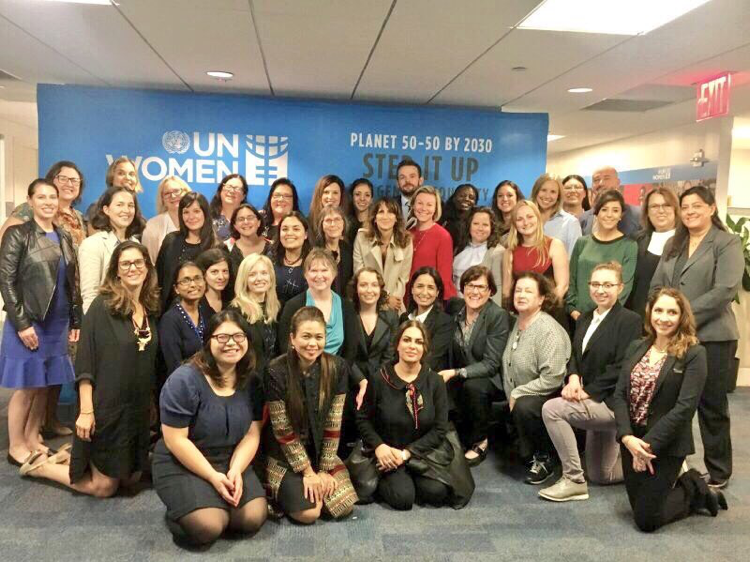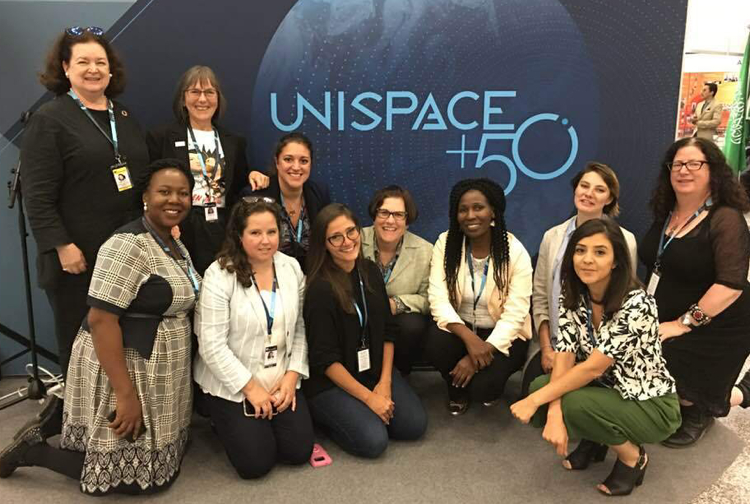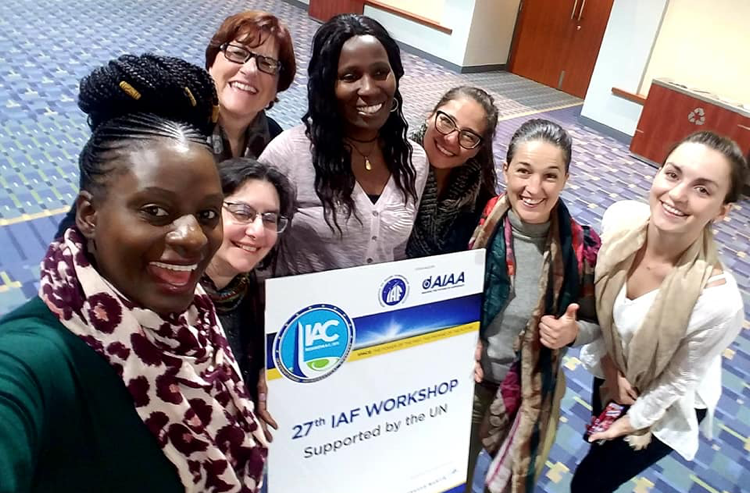Background and Beginnings of the Space4Women Group - A Mentor History
History of the Space4Women Group
This history researched and written by: Jan Millsapps, Ph.D., 7 April 2020
The Space4Women group grew from an informal network of women with the common goals of creating inclusive policy and advancement opportunities in the space industry and access to STEM education and training for women and girls around the world.
Background
In October 2017, UNOOSA and UN Women co-hosted an inaugural “Space for Women” Expert Meeting at the United Nations in New York, with the goal of creating and prioritizing specifics for an envisioned “Space for Women” project.
|
|
Attendees, including approximately 60 women from around the world, heard from government and private enterprise administrators and policy makers, scientists, aerospace professionals, engineers, educators, and arts/media professionals. Many made individual presentations and all participated in discussions on the topics covered. On the final day of the event, recommendations from the assembled group were considered at a high-level panel at UN Headquarters, including a proposal to establish a global network of role models and mentors working to further the advancement of girls and women in space sectors worldwide. The high-level panel adopted the following recommendations emerging from the Expert Meeting:
- Creating a UN-based online platform for exchange, communication and coordination
- Establishing global network of role models and mentors to promote careers in STEM and the space sector
- Conducting research on various aspects of women in STEM/aerospace, using this evidence to raise awareness
- Running a pilot program in capacity building in a selected country to assess enabling environment
- Planning a Space for Women forum, focusing on capacity building and awareness raising.
Valuable contacts were made among those attending the 2017 Expert Meeting, resulting in a self-organized, global Space4Women (S4W) group who continued to work alongside the UN to empower and advance the participation of women and girls in space sectors worldwide. Individuals within this informal network expanded use of online platforms to communicate, to collaborate on research and scholarship, to initiate and organize specifically focused interest groups, to plan and host events, and to share professional accomplishments within the group.

Expert Meeting group (Oct. 2017)
Some highlights of specific S4W activities following the 2017 Expert Meeting include:
- Expanded Bay Area Space for Women group, with international outreach
- New York Space for Women group, with international outreach
- Susan Murabana Owen and her Traveling Telescope initiative featured in Jan Millsapps’ Madame Mars newsletter
- Model Mars project advanced by Futuristas (Jen Breslin and others)
- Launch of Scherezade: She Speaks Science, a communication platform that aims to make science accessible, open and inclusive, by Gina Halabi, who also hosted programs by several S4W women (Sara Langston, Jan Millsapps) at the University of Cambridge and at other locations in the UK
- Adrienne Provenzano and others have included information about the UN’s Sustainable Development Goals, Space4Women, Space4Youth, and Space4All programs in various conference presentations
- Cassie Lee of Brooke Owens Fellowship connected with Charity Weeden, who is now a Brooke Owens Fellowship Mentor and part of the Fellowship Selection Committee
- Since presenting her paper at the Expert Meeting, Chidinma Iroka has continued to write about girls, women and STEM education. Her paper, “Space Science and Technology: The Future of Girls/Women in Africa,” will soon be published.
In June 2018, many of those who met at the 2017 Expert Meeting in New York reconvened at the UNISPACE+50 event, held at UNOOSA headquarters in Vienna. Following an afternoon “Space for Women” panel, filmmaker and educator Jan Millsapps presented her new documentary, “Madame Mars: Women and the Quest for Worlds Beyond.” After the screening, Millsapps moderated an international panel (Jen Blank, Jen Breslin, and Basuti Bolo), who discussed issues raised by the film, and possible solutions to challenges faced by women in the space arena, including STEM preparation, educating and empowering women globally, and ensuring female futures in space.

UNISPACE+50 group (June 2018). First row: Chidinma Iroka, Jennifer Breslin, Alessandra Abe Pacini, Ghina Halabi. Second row: Amanda Moore, Jan Millsapps, Alissa Haddaji, Jennifer Blank, Basuti Bolo, Guilia Persoz, Alice Gorman
Some S4W activities following the UNISPACE+50 event include:
- World Space Week (October 2018) events:
- Women in Space Nigeria (Chidinma Iroka and others)
- Ladies Do Launch, a series of coordinated panels of women in the space industry, held in New York, Washington, DC, Seattle and San Francisco Bay Area (organized by Allegra Searle-LeBal, Timiebi Aganaba-Jeanty, Jen Breslin and Jan Millsapps)
- Space Applications for Women’s Empowerment Working Group (Jen Breslin, Cassie Lee and others).
In October 2019, the Workshop on Space Technology for Socio-Economic Benefits: Ensuring Inclusiveness through Space-based Applications and Space Exploration was organized by the International Astronautical Federation (IAF) and supported by the United Nations Office for Outer Space Affairs (UNOOSA). Several women from the S4W group, including Susan Murabana Owen, Jen Blank, Alessandra Abe Pacini, Basuti Bolo, Pascale Lefebure, and Adrienne Provenzano, made presentations at the workshop.

Workshop on Space Technology for Socio-Economic Benefits group (October 2019): Susan Murabana-Owen, Adrienne Provozenko, Jennifer Blank, Basuti Bolo, Alessandra Abe Pacini, Pascale Lefebure and Milica Milosev
Current activities
In February 2020, the Space4Women Mentor Network was officially launched through UNOOSA. Many of the women who have participated in discussions and organization of the group since the first meeting in 2017 remain involved, and the informal S4W group has grown to include the official Mentor Network. Members of the S4W group stay connected through monthly meetings and enhanced communication channels, and continue to collaborate on common projects. Moreover, the S4W group continues its commitment to work collaboratively with the UN to advance the new mentoring network and online forum, and to participate in future “Space for Women” events, including the 2020 meeting in Brazil.


